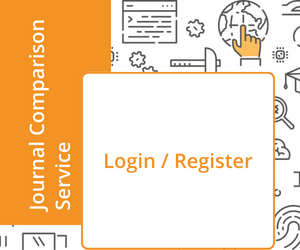Journal Comparison Service

Resources for publishers
Guides
- Registration & Access Process: step by step guide for publishers [pdf, png]
- Guide to the Journal Comparison Service for publishers, including information about how to register and use the service
- Data collection templates: choose one of our templates to start collecting your data in a ready for uploading format: Information Power template, FOAA-based template. [Update: Starting on 1st November 2024, the JCS will exclusively accept data supplied using the Information Power framework and will no longer support the FOAA framework 2024]
- Acceptable Use Policy
- Publisher service agreement
- ALPSP Event – Latest developments from cOAlition S: Journal Comparison Service & Fostering OA Agreements [recording, May 25, 2022]
Frequently asked questions
Customers are interested in more standard, transparent, and granular price and service information. By participating in this secure and free-of-charge service, publishers are able to demonstrate their commitment to open business models and business cultures and can build better awareness of and appreciation for their services and value.
Publishers were invited to register for the service and deposit their 2021 data by the 31st of October 2022. A list of publishers/journals that are sharing data through the JCS is available at https://journalcheckertool.org/jcs.
Read also: More than 2000 journals share price and service data through Plan S’s Journal Comparison Service
The publisher portal is live since May 2022. Publishers are able to register for an account on the Journal Comparison Service, sign the participation agreement and, once approved, upload their 2021 price and service data.
The Journal Comparison Service supports two frameworks. Publishers can select whichever framework they find most convenient.
1. Information Power framework: An independent project led by Information Power in 2020 worked with publishers and other stakeholders to develop a framework for the transparent communication of open access prices and services. This framework was piloted and refined by Annual Reviews, Brill, The Company of Biologists, EMBO Press, European Respiratory Society, F1000 Research, Hindawi, IOP Publishing, PLOS, and SpringerNature. There are three sections: the first for high-level information about the journal title, the second for a range of metrics that together convey a sense of the nature and quality of the title, and the third to indicate the percentage of the total price apportioned to publishing services.
Download the framework.
2. Fair Open Access Alliance (FOAA)-based framework: The FOAA developed a Publication Services and Fees framework in 2018, which has been implemented by Frontiers, MIT Press, Copernicus, and MDPI.
[Important update: Starting on 1st November 2024, the JCS will exclusively accept data supplied using the Information Power framework and will no longer support the FOAA framework 2024. Read more: Journal Comparison Service adopts a single pricing and service framework to simplify data comparison]
To ensure that the data are relevant and comparable, publishers are asked to refresh the data annually in arrears. So, in 2022, data for 2021 would be uploaded. In 2023, data for 2022 would be uploaded. And so on. Data must be supplied by the 31st of October. So, for 2021 data, this must be supplied by 31st October 2022.
No. Registered publishers can only upload and see their own data; they cannot see other publishers’ data. The end users are libraries, library consortia, and funders who have accepted agreements prohibiting them from sharing the Publisher Data with anyone outside of their institution or with any journal publishing department within their institution.
All end users are required to agree to an Acceptable Use Policy, which includes information on the potential risks to Competition Law if this information is shared outside of the End User’s institution. At regular intervals, End Users are reminded of their obligations under the Acceptable Use Policy.
No. Researchers will not have access to these data. This decision was taken to ensure that publishers do not access each other’s data by accident through a researcher who may be also working for a publisher.
However, via the Journal Checker Tool, researchers can see whether a journal has provided data to the Journal Comparison Service or not. Researchers who support the values of openness and transparency may use this information to determine whether to submit their manuscripts to a particular journal.
Security of publishers’ data is important for us. It is why we developed a model that allows only authorised users (librarians, consortia, and funders) to log onto the service, and examine data for a particular journal or compare journals. Publishers themselves cannot access the data of other publishers.
Access to the data is made secure through two-factor authentication (2FA), the industry standard in security.
There are strong controls over the data in the Journal Comparison Service. Only registered and verified users can access the data via the web interface and there are no APIs to enable institutions to retrieve data.
The Journal Comparison Service keeps publishers’ data safe by storing raw data on a secured Amazon S3 site. Any data being indexed, searched, and compared is stored on an internal data store which is also secured. Data in transit is encrypted by the appropriate Transport Layer Security (TLS).
We run security checks on a regular basis to cover any attacks that have emerged. There is regular security audit and penetration testing by an external party. The security arrangements will evolve as we add new features or modifications to the service.
>> See also: Registration & Access Process: step by step guide for publishers [pdf, png]
The Journal Comparison Service will only be made available to authorised users who participate in Open Access agreements with academic publishers. These agreements include Read and Publish Agreements, Publish & Read Agreements, Transformative/Transitional agreements, Subscribe to Open, Community Action Publishing Agreements, and other OA agreements with publishers.
As part of the application process the End User Administrator will be requested to provide details of such agreements where the information is publicly available. Typically this will be provided by a link to a relevant agreement in the ESAC registry or to a page on a publisher web site.
In addition to the registration process described above, cOAlition S staff will check publishers that apply for registration for the following:
- Are any journals they publish indexed in DOAJ?
- Is the content indexed by PubMed, Scopus or the Web of Science?
- If a journal is indexed INASP Journals Online, which platform indexes this content?
- Is the publisher a member of COPE?
- Is the publisher a member of a publisher trade body?
If a publisher cannot provide any evidence that they are party to at least one of these services, we anticipate that the application will not be taken forward.
To mitigate the risk of users sharing data with unauthorised people, we will require:
i) A named individual at an End User institution to sign a legally binding agreement which makes it clear that sharing of data outside that institution is prohibited, and that in the event that clause is breached, there are penalties on the End User.
ii) The End User must nominate an End User Administrator who will be responsible for enabling (and disabling) End User accounts for that institution.
iii) All End User Authorised Users will have to read and accept the Acceptable Use Policy before they can access the service. The AUP includes information about the risks of sharing information. End User Authorised Users will be required to accept the AUP on a time-based policy (i.e. every days or so; frequency to be determined.)
iv) When an Authorised User attempts to download data they are reminded of the requirement that data must not be shared and must agree to a pop-up message before the download begins.
“By using this Service, you acknowledge that your access to the Service is subject to complying with the applicable competition law rules. In particular, you agree that you will not, directly or indirectly, share with or make available the information provided by the Service to non-authorized persons, and in particular to publishers”.
The downloaded data will be packaged up such that, in addition to the data, the End User Authorised User is also provided with a copy of the AUP and a summary document which again stresses that data must not be shared.
Do you have more questions not answered above? Or feedback to share from using the Journal Comparison Service?
Send us a message at info@coalition-s.org, and we will get back to you the soonest.
Copyright © 2025 European Science Foundation Privacy Notice | Disclaimer and Copyright | Cookie Notice Webdesign by ALYS


